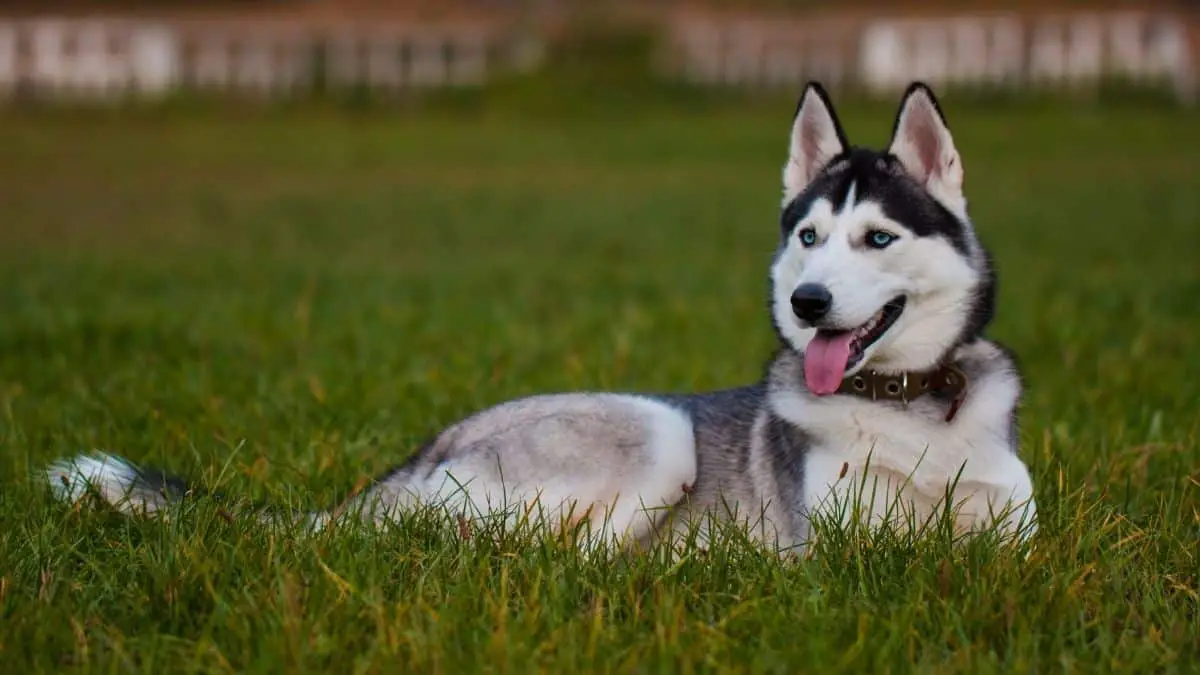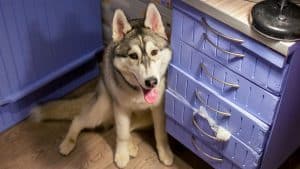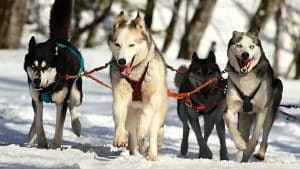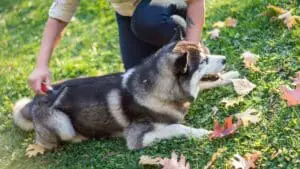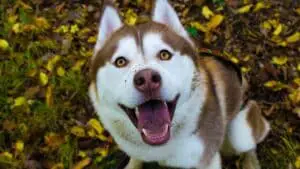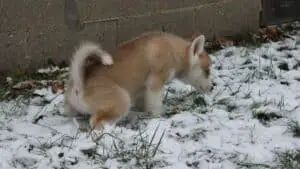Common Siberian Husky Problems & Solutions (Fully Explained)
When researching the best breed of dog to make your new family pet, there are a variety of factors you need to take into consideration. Depending on your circumstances and living situations, you may even be lucky enough to be considering a Siberian Husky!
Before committing to a Siberian Husky, you should do your research and understand the full implications of bringing this particular breed into your home. Training requirements, health issues, and behavioral tendencies are all important factors to take into account when considering making a Siberian Husky part of the family.
Siberian Huskies live very healthy lives with a lifespan of between 11-15 years. As with taking on any new family pet, bringing a Siberian Husky into your home requires a long term commitment. You can make this commitment easier and live a long and happy life with your Husky if you are fully prepared and aware of all the requirements and needs of this unique breed.
Table of Contents
A background on Siberian Huskies
To better understand why Siberian Huskies have the unique personality quirks and behavioral traits that they are known for, it’s helpful to understand the origins of this breed of dog.
Siberian Huskies were originally bred as sled dogs in the far northeastern regions of Asia by the Chukchi people. These hardworking, high energy dogs with a wolfish appearance were bred to pull heavy sleds over long distances in cold, challenging conditions.
As well as being bred as working dogs, Huskies are also unique in that they were intended to be companion animals. This is the reason your Husky pup is so friendly – he was born to it!
There are many genetic factors that were bred into your Husky a long time ago, and which will still be evident in your modern-day Husky puppy. His coat type, his exercise requirements, his health – much of it stems back to those sled dogs from Siberia!
Some common Siberian Husky problems and how to deal with them
Health issues
Just like any other dog, Siberian husky problems include health issues. Health issues in Siberian Huskies can be the same as those that impact many other breeds of dogs, but they also suffer from genetic disorders.
Siberian Huskies often suffer in relation to their eye health. Eye disorders are the most common health complaint in Huskies and can be extremely serious.
Eye disorders that your Husky can face include hereditary or juvenile cataracts, progressive retinal atrophy, corneal dystrophy, and uveodermatological syndrome.
If you are considering becoming a Husky owner, it is important to understand these eye disorders and ensure that your Husky’s eyes are checked by a vet on a regular basis.
Cataracts
Cataracts can begin to develop in Siberian Husky puppies as early as three months of age. These are known as hereditary, or juvenile, cataracts.
Unlike most canine cataracts, juvenile cataracts do not result from old age. These cataracts are incredibly common and can affect up to 10% of Huskies.
Cataracts result when there is a build-up of protein film in the eyeball, which eventually deforms the eye’s lens. Cataracts can impact one eye or both eyes and can lead to blindness.
Progressive Retinal Atrophy
Progressive Retinal Atrophy (PRA) is another eye disorder that can impact the health of your Husky. Just like cataracts, PRA can cause blindness in your dog.
PRA involves the gradual, continual deterioration of your Husky’s retina. This is an extremely difficult and expensive issue to fix, and early detection is vital. Regular checkups with a vet who is experienced in canine ophthalmology are critical in defeating this particular health problem.
Corneal Dystrophy
Corneal dystrophy mostly affects female Huskies. Although this disorder rarely leads to blindness, it is often mistaken for cataracts and may need specialist intervention and diagnosis.
Corneal dystrophy will appear as small white dots in the cornea of your Husky’s eye. Among other things, it can cause hazy vision that can make it difficult for your Husky to see.
Unfortunately, there is no known cure or treatment for corneal dystrophy.
Uveodermatological Syndrome
Uveodermatological syndrome is rather a unique condition. For first-time Husky owers, it can look rather alarming. This condition affects not only your Husky’s eyes but also it’s skin.
Although rare, uveodermatological syndrome is extremely serious and can lead to blindness in Huskies.
If your Husky is afflicted with uveodermatological syndrome, their immune system will begin to form antibodies that will attack the light-sensing cells in the back of the eye. In addition to this, the disorder will impact the pigment cells in the skin.
In Siberian Huskies, the result is sore, red eyes, the loss of pigment in the face and footpads, and loss of color in the fur. Largely, these issues are superficial. This means your vet will typically focus on the eye problems that result from uveodermatological syndrome. As this health condition can lead to permanent blindness, early intervention is crucial.
Treatments and corrective surgeries of eye problems are very expensive, and can sometimes not achieve the desired result. Prevention is the best cure when it comes to Husky eye issues, and detecting any eye health concerns while they are still in their infancy will help your Husky stand the best chance of overcoming these concerns. It goes without saying, that when you own a Siberian Husky, yearly eye checkups are a must.
Hip Dysplasia
Hip dysplasia can develop within the first two years of your Husky’s life but is most common around middle age. With hip dysplasia, your Husky’s hip joint will be unstable or lax.
The biggest risk factor for your Husky developing this condition is genetics. If his parents or other close relatives in his pedigree have suffered from hip dysplasia, then it is likely that he too will inherit this condition.
Hip dysplasia causes pain, inflammation, and arthritis of the hip. In the longer term, it can lead to the loss of cartilage in the hip joint, the development of scar tissue, and the formation of bone spurs in the ball and socket.
Behavioral issues
Another problem that Huskies can suffer from is their need for the company of people or other dogs at all times. As they were originally bred as companion animals (the original family pets!), they are very social dogs.
If you considering taking on a new furry friend, you may wonder why it would be a problem for your dog to want to spend most of his time around you. After all, isn’t that why you’re bringing him home?
This tendency for attachment and attention can become a problem when you, the owner, have to leave home. Siberian Huskies may develop separation anxiety, resulting in a multitude of problems that may include excessive howling, biting, chewing, and digging.
This is a serious issue, especially if you live in a busy household where it is not always possible to be at home all the time. As pack dogs, Huskies are not cut out for loneliness and may display undesirable behavior when they do not have company. Proper training, including professional behavioral training, can assist with this.
If you love your garden, you may need to reconsider bringing a Siberian Husky into your home. Siberian Huskies love to dig, and will dig holes in your backyard, flower garden… you name it!
Another inconvenient behavioral trait includes the Siberian tendency as an escape artist. If not given vigorous exercise, your Husky may decide to expend some of his energy by leaping over your fence and exploring the neighborhood.
As well as being a nuisance, this can also present a danger to your Husky. If not properly exercised and contained, he could prove a nuisance to himself and others.
After a good guard dog? Maybe look elsewhere. The friendly nature of a Siberian Husky means that they make terrible guard dogs, and will very likely welcome any strangers with open paws!
Despite this friendly nature Huskies tend to have a problem with small animals. Their natural prey drive means they are not good with rodents, cats, and other small animals, and will often chase and attack them.
Siberian huskies rarely bark. But that is no reason to sign in relief. Instead, they will howl which can be extremely irritating to neighbors (as much as it sounds like music to the Husky and his owner’s ears!). You can take steps to mitigate this howling, but you will need to be consistent and diligent in curbing this behavior.
Training issues
Training a Siberian husky may often prove to be a very challenging task. They have a mind of their own, and this independent streak can prove troublesome during the training process.
When training these dogs, you should know that the two most important principles are consistency and positive reinforcement. Oh, and you should always have a pocketful of treats close to hand whenever attempting any sort of training!
Husky grooming
Considered by many to be their crowning glory, a Husky’s coat requires special treatment of its own. You will need to regularly brush your Husky (daily brushing is not required), and invest in the proper tools to make his grooming a smooth process (no pun intended!)
Frequently Asked Questions
Are Huskies good for first-time dog owners?
Siberian Huskies do require dedicated training and care. Their independent streak and high levels of intelligence mean that they can present somewhat of a difficulty for first-time dog owners who are not experienced in training pups.
That being said, if you are willing to take a committed, positive approach to your furry friend’s training, there is no reason why you would be able and capable of training a Siberian Husky puppy.
Are Huskies safe as family pets?
Extremely friendly (to the point of being terrible guard dogs!) and extremely affectionate, Siberian Huskies can make for a great family pet.
You may need to exercise some caution with small children, who may inadvertently push the buttons of these strong-willed, independent dogs. That being said, a well trained, adequately exercised Husky will not have any reason to growl at the little ones.
Will I need to take my Husky to the vet often?
Broadly speaking, Siberian Huskies are healthy, robust dogs. Beyond regular, yearly check-ups with a vet who is experienced in dealing with Siberian Huskies, you will not need to do too much to keep your Husky healthy and happy.
There are some genetic disorders that Huskies are predisposed too, and will require careful monitoring over your time as a Husky owner. Certain skin conditions, eye disorders, and physical ailments will all impact your Husky if his family tree predisposes him to it.
If you have purchased your purebred Husky from a reputable breeder, you will be made aware of these disorders at the time of purchase. Some of these disorders can not be prevented, but with regular observation and maintenance, they can be managed and monitored to keep your Husky healthy and as happy as possible.

